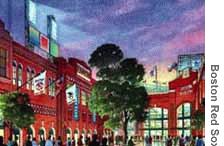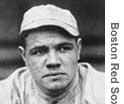|
Bidding for the Red Sox
|
 |
August 3, 2001: 9:12 a.m. ET
Storied baseball franchise could cost $1B, including a new Fenway Park
A Weekly Column by Staff Writer Chris Isidore
|
NEW YORK (CNNfn) - For sale: money-losing company with antiquated facilities in need of costly and controversial replacement and a history of disappointing customers for the last 83 consecutive years.
Despite that less-than-appealing description, a for-sale notice like this has generated a great deal of interest. That's because the company involved is the Boston Red Sox, one of the most beloved sports franchises in the world.
"We have two to three times as many bidders than for any other recent sale," said Justin Morreale, an attorney representing the Yawkey Trust, the entity that has run the team since the death of Jean Yawkey in 1992 ended the 59-year reign of the family that controlled the team.

|
|
|
Chris Isidore covers the business of sports for CNNfn.com | |
On Aug. 15, the attorneys handling the bidding for the team will narrow a list of seven to nine groups down to two or three finalists. Those bidders will gain access to more detailed financial data and the chance to buy the team for hundreds of millions of dollars. The winner also is expected to build a new Fenway Park, which has an initial estimated cost of $350 million.
Forbes magazine estimates the value of the team at $339 million, but bidding for the Yawkey Trust's 53-percent ownership of the club is expected to be near that value by itself. If the new owners decide to buy out minority holders, the total price could top $1 billion.
The team won't identify the bidders, most of whom are billionaires with strong New England ties, some of whom have tried and failed to buy other teams. But among those known to be bidding for the team are:
* Charles Dolan, the chairman of cable and entertainment company Cablevision Systems Corp. (CVC: Research, Estimates), which already owns NBA, NHL and WNBA teams, albeit all in hated New York.
| |

|
|
The new owners of the Red Sox will not only have to spend hundreds of millions for a majority share of the team, they'll have to try to win approval of a new Fenway Park, shown here in an artist's rendering on the right, next to the current park shown on the left. | |
* Aramark Corp., the third-largest food concession supplier with annual sales of $7.3 billion and an existing minority stake in the Red Sox. The company announced plans in July for a $600 million initial public offering.
* Jeremy Jacobs, the owner of Delaware North Cos., a privately-held food concession company with about a fifth of Aramark's revenue but which already owns the Boston Bruins hockey team and the Fleet Center, where the Bruins and Boston Celtics play.
Jack Welch, Massachusetts native, life-long Red Sox fan and soon-to-retire CEO of General Electric Co., apparently won't be a part of Dolan's bid, despite earlier reports that he would join his friend Dolan in his effort. A Dolan spokeswoman said there is no agreement between Dolan and Welch and a GE source said the report was unfounded.
Still, there are plenty of billionaires out there who believe they have both the wisdom and the resources to turn around a franchise that has suffered since selling Babe Ruth to the New York Yankees in 1919 for $100,000 in order to finance the Broadway investments of the team's owner at that time.
But unfortunately for long-suffering Red Sox fans, sports teams are almost always bought by billionaires who promise to stay in the background and let the professionals run the team. Most take some time to live up to that promise, if they ever do.
Even Yankees owner George Steinbrenner, a man who fired 19 managers in his first two decades in control of the Yankees, promised as much on the day he bought the team in 1973. CNN founder Ted Turner once took the field to manage his Atlanta Braves himself before the commissioner ordered him out of the dugout.

|
|
Charles Dolan
The chairman of Cablevision, which owns the New York Knicks and Rangers, would like to add a baseball team to his collection. | |
Both men found far greater sustained success on the field once they started leaving more player personnel and other team decisions to professionals within the organization.
"Most people get involved with sports ownership because they're big sports fans," said one sports executive who came to the field from the world of business when his billionaire owner made the jump. "The reason there are sports fantasy leagues is it's fun to sit there and try to match wits with a guy. It's a bit of folly for the owner to step in and say he knows more about talent than someone scouting around the world for 23 years.
"But they want to be involved in the team because it's the fun side," continued the sports executive. "There's a tendency to lose sight of basic fundamental business principles. A new boss wouldn't come into an automaker and say this should be an eight-valve engine rather than 12, or tell the vice president of marketing how to do their job."
Dolan has had a relatively hands-off approach to the operation of the New York Knicks, Liberty and Rangers, which are owned by Cablevision. It's an open question whether he would take the same approach with the Red Sox, which he is bidding on personally.
Dolan had hoped at one time to buy the rival Yankees, and recently lost the rights to broadcast the team's games on his New York regional sports network. His brother Larry owns the Cleveland Indians, another long-suffering American League team.
| |

|
Babe Ruth
Many Red Sox fans believe the team has been cursed since a previous owner sold Babe Ruth to the Yankees in 1919 to raise money for a fling at Broadway producing. | |
One attraction for Dolan is that the team owns the New England Sports Network (NESN), which would be a good fit with his cable operations. Ownership of NESN under a Dolan bid has yet to be determined, according to a Dolan spokeswoman.
Jacobs' bid scares many Red Sox fans, given that the Bruins have not won a championship in the 26 years he's owned the team, and his reputation for cheapness when competing for players.
It doesn't take nightly phone calls to the manager's office for a team owner to have a direct impact on personnel decisions. A phone call once a year to the general manager to set a payroll budget can have a far greater impact than an owner's tinkering with a team's batting order.
It's possible that the new Red Sox owner will take that kind of economic hard line, looking for a profitable investment rather than the ego boost that would accompany a championship and the resulting sainthood for the owner across New England.
Despite soaring player salaries and tough economics from the current Fenway Park, it's still possible for a new owner to turn a profit on the team. A new park should greatly increase team revenue, and the addition in the sales package of NESN could be a boon in the sports-crazed region.

|
|
Jeremy Jacobs
Bid by owner of the Boston Bruins has raised concerns of Red Sox fans due to the hockey team's inability to win championships or high-priced players. | |
But Red Sox fans could find that their loyalty to the team could work against their dreams. Despite playing in a park with the highest ticket prices in the league, coupled with limited creature comforts and pillars in front of some fans' seats, the team sold a greater percentage of its seats than all but two other teams last year.
What's more, it has a history of drawing well even in down years. During the team's most recent last-place finish in 1992, it still filled 90 percent of its seats.
A new owner looking at the team from a strict dollars-and-cents point of view may decide that revenues would not take much of a hit even if the team's payroll, and wins, were slashed.
Despite injuries to many of its top players, the team still finds itself in the hunt for a playoff spot this year, and has a chance at its first championship since baseball was first broadcast on radio, let alone cable or the Internet. But this year there's more than the Yankees to make the team's fans nervous. 
|
|
|
|
|
 |

|

